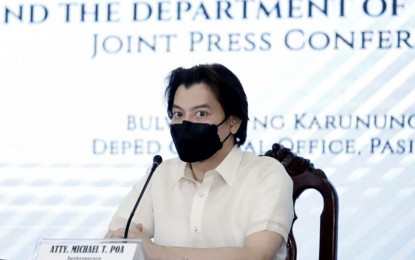
DISASTER RESILIENCE. Education spokesperson Michael Poa says the department is studying how to improve school building designs to ensure disaster resilience, in a joint press briefing on Friday (Sept. 30, 2022). He said an estimated PHP1.17 billion is needed to repair schools damaged by Super Typhoon Karding. (PNA Photo: Alfred Frias)
MANILA – The Department of Education (DepEd) said Friday it is looking into institutionalizing blended learning, as well as coming up with a disaster-resilient design for schools.
In a press briefing, DepEd spokesperson Michael Poa said institutionalizing a blended setup in basic education can help manage the effects of an increasing number of learners and the impacts of natural calamities.
"Bakit pinag-aaralan na po 'yung pag-institutionalize ng blended learning as a mode in our schools? Dahil po ang pananaw diyan ng Department of Education ay ito ay isa sa solusyon para diyan sa classroom shortage (Why are we studying to institutionalize the blended learning mode in our schools? Because in the DepEd’s point of view, it can solve classroom shortage). This is something that we are reviewing right now. And we are looking if it is possible to institutionalize blended learning sa ating basic education schools," he said.
Blended learning includes arrangements for both in-person, online, and other modular or alternative modes.
"Talagang mahirap nang resolbahin 'yung pagdating sa classroom shortage, kasi bukod sa ating backlogs, perennial problem na po 'yung ating classroom shortage, dahil taun-taon, dumadami rin 'yung ating enrollees, at taun-taon may kalamidad na dumadaan sa ating bansa (It’s really hard to resolve classroom shortage, besides the backlogs, it’s a perennial problem, because yearly, we have a rising number of enrollees, and yearly there are calamities, hitting the country)," Poa added.
For Super Typhoon Karding alone, around 165 schools sustained damage, which hikes the estimated cost for repair of schools to PHP1.169 billion.
Poa said the DepEd is also looking into coming up with an improved design of schools that may be resilient to various calamities.
“Pinag-aaralan na po 'yung tinatawag nating (we are studying what we call) disaster-resilient schools, so in collaboration with the private sector and other organizations. Pinag-aaralan na po nila kung paano mai-improve 'yung school designs natin, para maging (They are reviewing how to improve school designs so it can be) disaster-resilient po siya," he said.
As of now, typhoon-affected schools automatically shift to alternative learning modalities during a calamity.
“Right now, we are already starting to download or we are looking to download funds to our regions to start the requirements and build temporary learning spaces or other interventions but this is a developing situation,” Poa said.
Curriculum review
Poa, meanwhile, said the DepEd will continue consultations with stakeholders until October after they finish reviewing the Kinder to Grade 10 curriculum, while they will start the review of the Grades 11 to 12 curriculum by November.
“We want to focus on literacy, specifically on foundational literacy and functional literacy. For now, it's still being vetted, we can't give a comprehensive report yet on the results of the review,” he said.
He also expressed hope to wrap the review up for the entire K-12 program by June 2023.
The DepEd also vowed to include adjustments to the program that aim to address job mismatch.
“Ang promise po ng K-12 (Our promise in K-12) is that when our learners graduate after Grade 12, they are employable pero hindi po nangyayari yan sa ngayon. So ang direksyon po natin is to try to align yung mga (but it’s not happening now. So the direction is to align) skills , especially tech voc track, yung mga skills na nakukuha nila sa (their acquired skills in) Grade 12 to the industry demand,” Poa said. (PNA)
